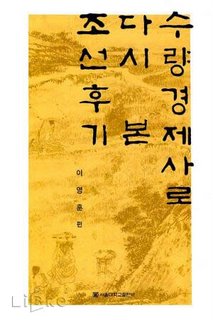Book note: Late Joseon in Quantitative Economics History
 There is a new book out edited by the economic history professor Yi Yông-hun (Lee Young-hoon?) with the title Late Chosôn (Joseon) in Quantitative Economic History (수량경제사로 다시 본 조선후기, SNU Press). Lee was the professor who ended up getting enormous flak for talking in a TV debate in a manner which in ill will could be interpreted as denying the forced nature of the Japanese military prostitution. It didn't help much when he tried to explain that the initial news reports of his statements had been misleading. (What he did say was that there were voluntary Korean pimps but that the prostitution was slavery in nature.) There is a new book out edited by the economic history professor Yi Yông-hun (Lee Young-hoon?) with the title Late Chosôn (Joseon) in Quantitative Economic History (수량경제사로 다시 본 조선후기, SNU Press). Lee was the professor who ended up getting enormous flak for talking in a TV debate in a manner which in ill will could be interpreted as denying the forced nature of the Japanese military prostitution. It didn't help much when he tried to explain that the initial news reports of his statements had been misleading. (What he did say was that there were voluntary Korean pimps but that the prostitution was slavery in nature.)Now to the new book. My hasty and haphazard translation of the publisher's introduction: The writers in this book looks at population, wages, interest rates, land prices, commodity prices, and long-term market trends since the 17th century from the point of view of quantitative economics. The authors have collected material from yangban household diaries and village records around the country. New findings are the big role of the redistributive role of the Chosôn state, the development and stability of the late 17th and 18th century, and the crisis of the 19th century. The writers do not agree with the established notion of continuous economic development from the 17th to the 19th century. By the 19th century, the economy stagnated and finally ended up in a severe crisis. One reason for that was the lack of any system to guarantee and stimulate economic growth. The book approaches the downfall (hwangp'ye) of livelihood since the 18th century from this angle. Prof. Lee Young-hoon is an SNU professor and the head of the Nakseongdae Institute of Economic Research, which as I understand is strongly maintaining that the Japanese colonialism was in the end the factor that got the Korean economic development and change going. This is part of the "sprouts theory" (maengaron 萌芽論) vs. "colonial modernization theory" (singminji kûndaehwaron 植民近代化論) debate, which is connected to the legacy of the Japanese colonialism, Korean nationalism - scary but interesting stuff. Oh yes, the sprouts theory is about finding "sprouts" of capitalism in the premodern, pre-opening Chosôn, like purchase by capital of other's labor power, that could have developed into full-scale capitalism even without the Japanese rule. I'm inclined to side with those don't see the sprouts theory hold water. • There's an English-language article available in pdf form: "Colonial Legacy and Modern Econmic Growth in Korea: A Critical Examination of Their Relationship". Development and Society vol 33:1 (2004), pp. 1-24. Categories at del.icio.us/hunjang: books ∙ academic ∙ Koreanstudies ∙ Koreaneconomy ∙ Koreanhistory |



Comments to note "Book note: Late Joseon in Quantitative Economics History" (Comments to posts older than 14 days are moderated)
Write a Comment